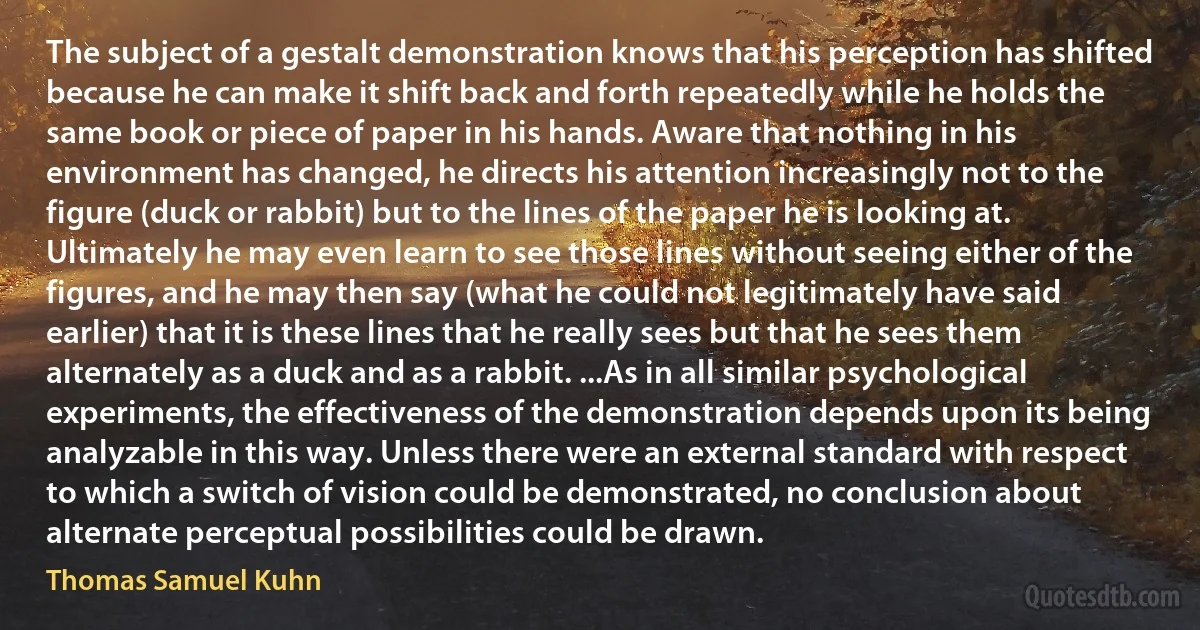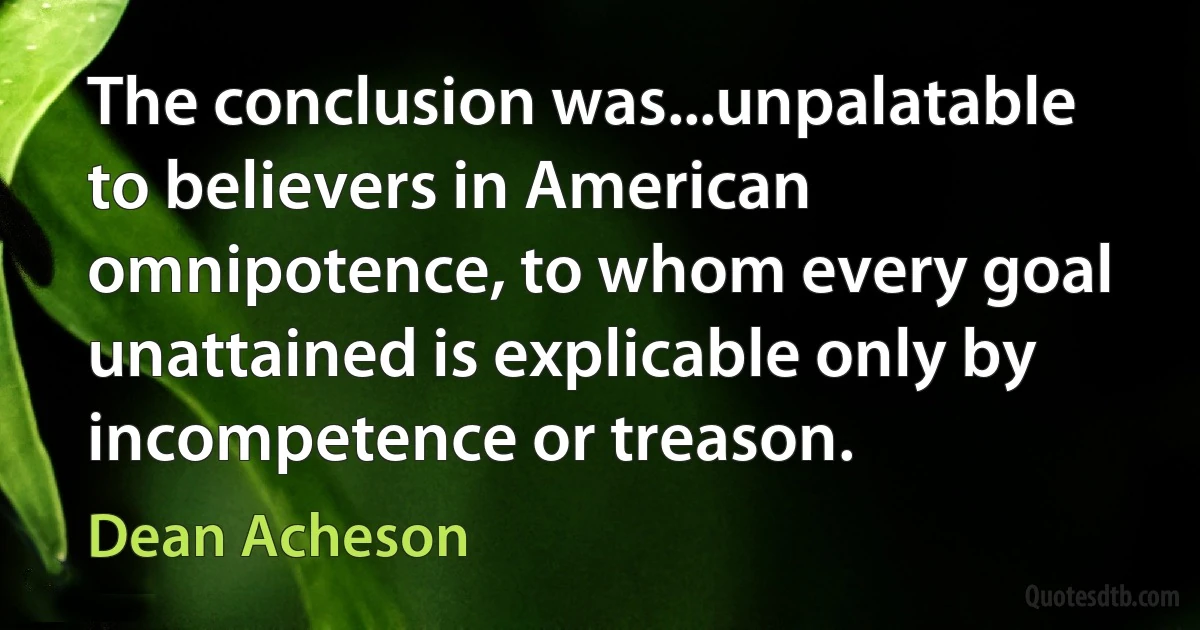Conclusion Quotes - page 8
Still on the whole the campaign is the best, cleanest and most satisfactory of the war. I have received the most fulsome praise of all men from the President down, but I fear the world will jump to the wrong conclusion that because I am in Atlanta the work is done. Far from it. We must kill three hundred thousand I have told of so often, and the further they run the harder for us to get them.

William Tecumseh Sherman
I have gradually come to one negative conclusion about the good life. It seems to me that the good life is not any fixed state. It is not, in my estimation, a state of virtue, or contentment, or nirvana, or happiness. It is not a condition in which the individual is adjusted or fulfilled or actualized. To use psychological terms, it is not a state of drive-reduction, or tension-reduction, or homeostasis.

Carl Rogers
Land, n. A part of the earth's surface, considered as property. The theory that land is property subject to private ownership and control is the foundation of modern society, and is eminently worthy of the superstructure. Carried to its logical conclusion, it means that some have the right to prevent others from living; for the right to own implies the right exclusively to occupy; and in fact laws of trespass are enacted wherever property in land is recognized. It follows that if the whole area of terra firma is owned by A, B and C, there will be no place for D, E, F and G to be born, or, born as trespassers, to exist.

Ambrose Bierce
The inescapable conclusion is that the direct contribution of man-hours and capital accumulation would hardly account for more than a tenth of the rate of growth in per capita product - and probably less. The large remainder must be assigned to an increase in efficiency in the productive resources, or the effects of changing arrangements, or to the impact of technological change, or to all three.

Simon Kuznets
Men called to the conduct of troops should prepare themselves to deal with cases more and more varied upon an ever-increasing horizon of experience. They can only be given the capacity to arrive at a prompt and judicious position by developing in them through study their power of analysis and of synthesis; that is, of conclusion in a purely objective sense, conclusion upon problems which have been actually lived and taken from real history. Thus also can they be founded through the conviction that comes from knowledge in a confidence sufficient to enable them to take such decisions upon the field of action.

Ferdinand Foch
Dark Energy. It can be found in the observable Universe. Found in ratios of 75% more than any other substance. Dark Energy. It can be found in religious extremists, in cheerleaders. To come to the conclusion that Dark signifies mean and malevolent would define 75% of the Universe as an evil force. Alternatively, to think that some cheerleaders don't have razors in their snatch is to be foolishly unarmed.

Tori Amos
One is left with the uneasy feeling that even if supersymmetry is actually false, as a feature of nature, and that accordingly no supersymmetry partners are ever found by the LHC or by any later more powerful accelerator, then the conclusion that some supersymmetry proponents might come to would not be that supersymmetry is false for the actual particles of nature, but merely that the level of supersymmetry breaking must be greater even that the level reached at that moment, and that a new even more powerful machine would be required to observe it!

Roger Penrose
Years ago I read a man named Machado de Assis who wrote a book called Dom Casmurro. Machado de Assis is a South American writer - black father, Portuguese mother - writing in 1865, say. I thought the book was very nice. Then I went back and read the book and said, Hmm. I didn't realize all that was in that book. Then I read it again, and again, and I came to the conclusion that what Machado de Assis had done for me was almost a trick: he had beckoned me onto the beach to watch a sunset. And I had watched the sunset with pleasure. When I turned around to come back in I found that the tide had come in over my head. That's when I decided to write.

Maya Angelou
The war plan was incompetent in its rejection of the advice from military professionals and the analysis of the intelligence was incompetent in its conclusion that our soldiers would be welcomed with garlands of flowers and cheering crowds. Thus we would not need to respect the so-called Powell doctrine of overwhelming force.
There was also in Rumsfeld's planning a failure to provide security for nuclear materials, and to prevent widespread lawlessness and looting.
Luckily, there was a high level of competence on the part of our soldiers even though they were denied the tools and the numbers they needed for their mission.

Al Gore
I should prefer to be free from torture; but if the time comes when it must be endured, I shall desire that I may conduct myself therein with bravery, honour, and courage. Of course I prefer that war should not occur; but if war does occur, I shall desire that I may nobly endure the wounds, the starvation, and all that the exigency of war brings. Nor am I so mad as to crave illness; but if I must suffer illness, I shall desire that I may do nothing which shows lack of restraint, and nothing that is unmanly. The conclusion is, not that hardships are desirable, but that virtue is desirable, which enables us patiently to endure hardships.

Seneca
Today, with the weapons of mass destruction at man's disposal, the human race itself is in imminent danger of being destroyed. It is a far cry from vegetarianism to atomic or hydrogen bomb, but if you look at it, there is no escape from vegetarianism ultimately if we want to escape from the hydrogen bomb. Any integrated view of life as a whole will reveal to us the connection between the individual's food and his behaviour towards others, and through a process of ratiocination which is not fantastic, we cannot but arrive at the conclusion that the only means of escaping the hydrogen bomb is to escape the mentality which has produced it, and the only way to escape that mentality is to cultivate respect for all life, life in all forms, under all conditions. It is only another name for vegetarianism.

Rajendra Prasad
A great many individuals ever since the rise of the mathematical method, have, each for himself, attacked its direct and indirect consequences. ...I shall call each of these persons a paradoxer, and his system a paradox. I use the word in the old sense: ...something which is apart from general opinion, either in subject-matter, method, or conclusion. ...Thus in the sixteenth century many spoke of the earth's motion as the paradox of Copernicus, who held the ingenuity of that theory in very high esteem, and some, I think, who even inclined towards it. In the seventeenth century, the depravation of meaning took place... Phillips says paradox is "a thing which seemeth strange"-here is the old meaning...-"and absurd, and is contrary to common opinion," which is an addition due to his own time.

Augustus De Morgan
Men of mixed blood in this country apply the name 'negro' to themselves, not because it is a correct ethnological description, but to seem especially devoted to the black side of their parentage. Hence in some cases they are more noisily opposed to the conclusion to which I have come, than either the white or the honestly black race. The opposition to amalgamation, of which we hear so much on the part of colored people, is for most part the merest affectation, and, will never form an impassable barrier to the union of the two varieties.

Frederick Douglass
My strongest conviction as to the future of the negro therefore is, that he will not be expatriated nor annihilated, nor will he forever remain a separate and distinct race from the people around him, but that he will be absorbed, assimilated, and will only appear finally, as the Phoenicians now appear on the shores of the Shannon, in the features of a blended race. I cannot give at length my reasons for this conclusion, and perhaps the reader may think that the wish is father to the thought, and may in his wrath denounce my conclusion as utterly impossible. To such I would say, tarry a little, and look at the facts.

Frederick Douglass
The universe is of the nature of a thought or sensation in a universal Mind... To put the conclusion crudely - the stuff of the world is mind-stuff. As is often the way with crude statements, I shall have to explain that by "mind" I do not exactly mean mind and by "stuff" I do not at all mean stuff. Still that is about as near as we can get to the idea in a simple phrase. The mind-stuff of the world is something more general than our individual conscious minds; but we may think of its nature as not altogether foreign to feelings in our consciousness... Having granted this, the mental activity of the part of world constituting ourselves occasions no great surprise; it is known to us by direct self-knowledge, and we do not explain it away as something other than we know it to be - or rather, it knows itself to be.

Arthur Eddington
The formulation "ways to faith" could be interpreted as implying that faith is a conclusion a person may come to after pondering certain facts about the world-facts about history, nature, or consciousness. If that were the case, one could lead a person to this conclusion by presenting these facts to him and pointing out their implications. I, however, do not regard religious faith as a conclusion. It is rather an evaluative decision that one makes, and, like all evaluations, it does not result from any information one has acquired, but is a commitment to which one binds himself. In other words, faith is not a form of cognition; it is a conative element of consciousness.

Yeshayahu Leibowitz



